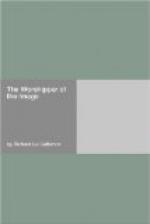“Does it really seem so strange, dear? I sometimes think you have never loved anything else.”
Antony had laughed down Beatrice’s fancies, yet all the time she had been talking he was conscious that the idea she had suggested was appealing to him with a perverse fascination.
To love, not the literal beloved, but the purified stainless image of her,—surely this would be to ascend into the region of spiritual love, a love unhampered and untainted by the earth.
As he said this to himself, his mind, ever pitilessly self-conscious, knew it was but a subterfuge, a fine euphemism for a strange desire which he had known was already growing within him; for when Beatrice had spoken of his loving an image, it was no abstract passion he had conceived, but some fanciful variation of earthly love—a love of beauty centring itself upon some form midway between life and death, inanimate and yet alive, human and yet removed from the accidents of humanity.
To love an image with one’s whole heart! If only one could achieve that—and never come out of the dream.
These thoughts gave him a new desire to look again at the image. He felt that in some way she would be changed, and he hastened up the wood in a strange expectancy.
CHAPTER IV
AT THE RISING OF THE MOON
But a week or two more, and Beatrice’s prophecy had progressed so far towards fulfilment, that Antony was going about the woods and the moors saying over to himself the name he had found for the Image, as we saw in the first chapter; and his love for Silencieux, begun more or less as a determined self-illusion, grew more and more of a reality. Every day new life welled into Silencieux’s face, as every day life ebbed from the face of Beatrice, surely foreseeing the coming on of what she had feared. For the love he gave to Silencieux Antony must take away from Beatrice, from whom as the days went by he grew more and more withdrawn.
It was true that the long lonely days which he spent in the wood bore fruit in a remarkable productiveness. Never had his imagination been so enkindled, or his pen so winged. But this very industry, the proofs of which he would each evening bring down the wood for that fine judgment of Beatrice’s, which, in spite of all, still remained more to him than any other praise—this very industry was the secret confirmation for Beatrice’s sad heart. No longer the inspirer, she was yet, she bitterly told herself, honoured among women as a critic. Her heart might bleed, and her eyes fill with tears, as he read; but then, as he would say, the Beauty, the Music! Is it Beautiful? Is it Music? If it be that, no matter how it has been made! Let us give thanks for creation, though it involves the sacrifice of our own most tender and sacred feelings. To set mere personal feelings against Beauty—human tears against an immortal creation! Did he spare his own feelings? Indeed he did not.




